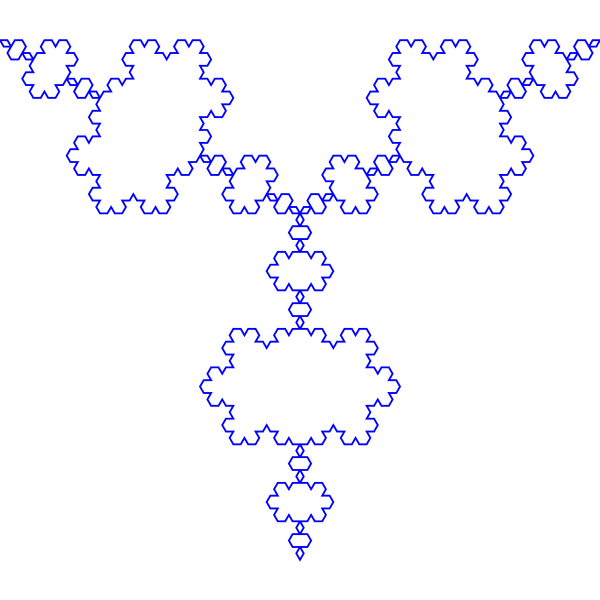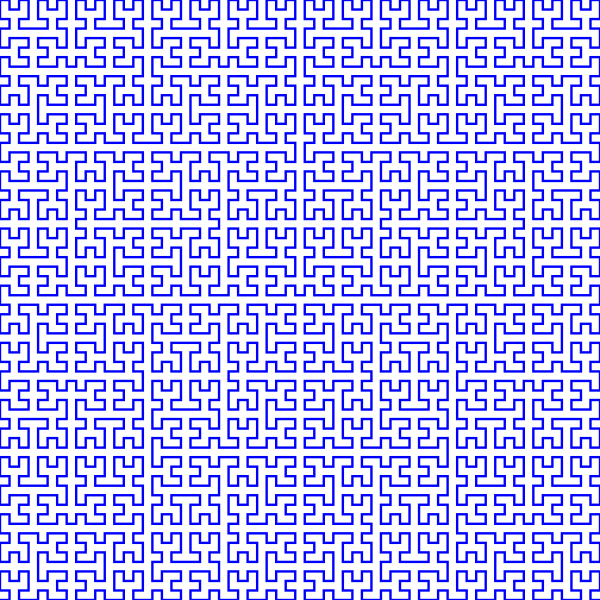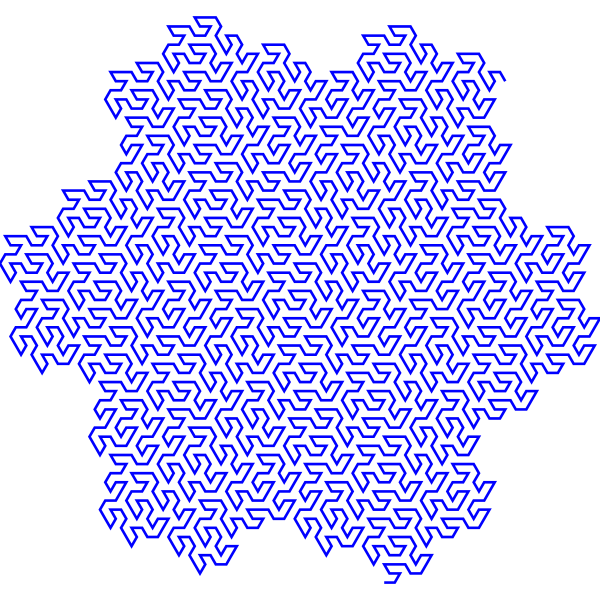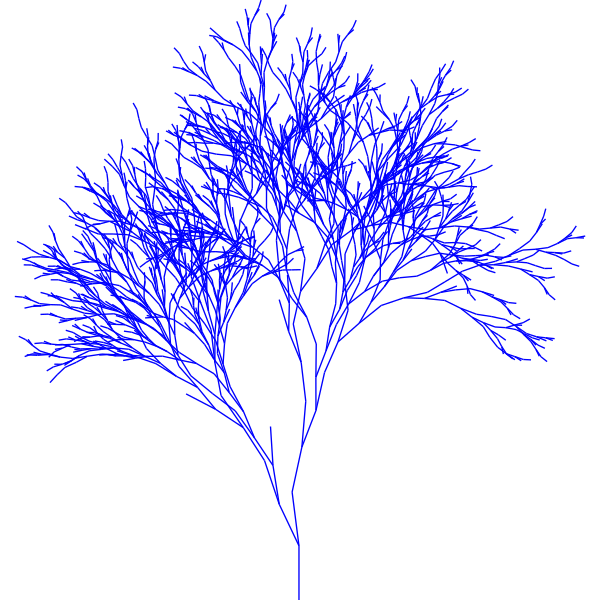Note
This is one of 199 standalone projects, maintained as part of the @thi.ng/umbrella monorepo and anti-framework.
🚀 Please help me to work full-time on these projects by sponsoring me on GitHub. Thank you! ❤️
Small, functional, highly customizable, iterator based L-System architecture for arbitrary rules, basic support for stochastic behaviors and with separation between symbol expansion and interpretation / execution. A base 2D turtle implementation is included. 0.6KB gzipped.
Partially based on Clojure version of @thi.ng/thingybot.
Planned features:
- parametric grammars
- max expansion length enforcement
- convergence testing
- 3D turtle implementation
STABLE - used in production
Search or submit any issues for this package
yarn add @thi.ng/lsysESM import:
import * as lsys from "@thi.ng/lsys";Browser ESM import:
<script type="module" src="https://esm.run/@thi.ng/lsys"></script>For Node.js REPL:
const lsys = await import("@thi.ng/lsys");Package sizes (brotli'd, pre-treeshake): ESM: 691 bytes
- @thi.ng/api
- @thi.ng/compose
- @thi.ng/errors
- @thi.ng/math
- @thi.ng/random
- @thi.ng/transducers
- @thi.ng/vectors
Note: @thi.ng/api is in most cases a type-only import (not used at runtime)
| Examples | |
|---|---|
 |
 |
 |
 |
import { expand, interpret, turtle2d, TURTLE_IMPL_2D } from "@thi.ng/lsys";
import { asSvg, svgDoc, polyline } from "@thi.ng/geom";
import { writeFileSync } from "node:fs";
const PI = Math.PI;
const impl = TURTLE_IMPL_2D;
// example L-Systems shown above
const examples = [
{ rules: { s: "[f++f++f]", f: "f+f--f+f" }, delta: PI / 3, iter: 5 },
{ rules: { s: "[f-f-f-f-f-f-f-f]", f: "f---f+f+f+f+f+f+f---f" }, delta: PI / 4, iter: 6 },
{ rules: { s: "[x]", x: "-yf+xfx+fy-", y: "+xf-yfy-fx+" }, delta: PI / 2, iter: 7 },
{ rules: { s: "[a]", a: "a-b--b+a++aa+b-", b: "+a-bb--b-a++a+b" }, delta: PI / 3, iter: 5 }
];
examples.forEach(({ rules, delta, iter }, i) =>
writeFileSync(
`lsys-ex${i}.svg`,
asSvg(
svgDoc(
{ stroke: "#00f", weight: 0.25, width: 600, height: 600 },
...interpret(
// create turtle instance with customized delta (rot angle)
turtle2d({ delta }),
// customize implementation to process syms "a" & "b" as "f"
{ ...impl, a: impl.f, b: impl.f },
// recursively expand start rule "s"
expand(rules, "s", iter)
//convert result paths to polylines for SVG export
).paths.map(polyline)
)
)
)
);The built-in default turtle implementation supports some basic stochastic features, e.g. randomization of growth direction and stochastic branch termination. This enables the creation of more organic looking structures, like shown in the following example:
import { expand, interpret, turtle2d, TURTLE_IMPL_2D } from "@thi.ng/lsys";
import { XsAdd } from "@thi.ng/random";
const PI = Math.PI;
const impl = TURTLE_IMPL_2D;
interpret(
// create turtle instance with customized delta (rot angle)
turtle2d({
// initial movement step distance
step: 20,
// initial direction
theta: -PI / 2,
// rotation offset
delta: PI / 10,
// direction jitter (percentage of delta, i.e. here 50%)
jitter: 0.5,
// initial survival chance
aliveProb: 0.999,
// decay factors for rotation, step, branch survival chance
decayDelta: 0.98,
decayStep: 0.85,
decayAlive: 0.975,
// use seedable PRNG for deterministic outcome
rnd: new XsAdd(0x7337c0de)
}),
// process syms "a" & "g" as "f"
{ ...impl, a: impl.f, g: impl.f },
// recursively expand start rule "s" by ping-ponging between f & g
// (only difference between f & g is swapped branch orientations)
// see description of all symbols further below
expand(
{
s: "[f]",
f: "a[kp!>/-g]/a[kp!>/+g]",
g: "a[kp!>/+f]/a[kp!>/-f]"
},
"s",
13
)
)The turtle2d() function creates a new state object for the L-System
interpreter (interpret()). The initial state can be customized by
providing a config object with the following options:
/**
* Current position
*/
pos: Vec;
/**
* Current direction (in radians)
*/
theta: number;
/**
* Rotation angle for "+" / "-" symbols
*/
delta: number;
/**
* Max. random direction change when processing "/" symbol.
* Normalized percentage of `delta`. Default: 0.25 (25%)
*/
jitter: number;
/**
* Step distance. Default: 1
*/
step: number;
/**
* Probability to keep current branch alive when processing "k"
* symbol. Default: 0.99
*/
aliveProb: number;
/**
* Decay factor for `delta`. Should be in (0,1) interval.
* Default: 0.9
*/
decayDelta: number;
/**
* Decay factor for `step`. Should be in (0,1) interval.
* Default: 0.9
*/
decayStep: number;
/**
* Decay factor for `aliveProp`.
* Default: 0.95
*/
decayAlive: number;
/**
* PRNG to use for probability checks. Default: SYSTEM
*/
rnd: IRandom;f- move forward & add to current pathg- move forward & start new path+- rotate ccw-- rotate cw>- shrink rotation angle offset<- grow rotation angle offset/- jitter directionk- stochastically kill branchp- decay survival chanceP- increase survival chance!- decay step distance^- grow step distance[- start branch / store context on stack]- end branch / pop context from stack
If this project contributes to an academic publication, please cite it as:
@misc{thing-lsys,
title = "@thi.ng/lsys",
author = "Karsten Schmidt",
note = "https://thi.ng/lsys",
year = 2019
}© 2019 - 2024 Karsten Schmidt // Apache License 2.0




